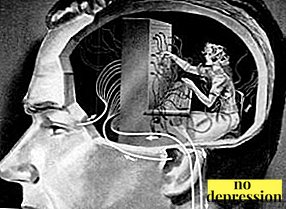Many often wonder Why do you need math?. Often, the very fact that this discipline is included in the compulsory program of universities and schools puts people at a loss. This bewilderment is expressed in the following: They say, why should I, a person whose future (or current) profession will not be involved in calculating and using mathematical methods, know mathematics?

How can this come in handy in my life? Thus, a large number of people do not see any sense for themselves in mastering this science, even on elementary principles. But I am sure that mathematics, more precisely, the skills of mathematical thinking, are needed by everyone. In this article I will explain why I am so sure of this. First, I will tell why this discipline, as scientific knowledge and method, is needed in general and where its place is in the system of all natural sciences and how it is applied in practice.
If you already know this, but still you are wondering why the study of this discipline is necessary for you personally, then go straight to the second part of the article. There, I will talk about what personality traits math helps to develop, and what will you lose if you refuse to master this subject, at least at a basic level.
Place of mathematics in the system of sciences
Mathematics is a fundamental science whose methods are actively used in many natural disciplines, such as physics, chemistry and even biology. By itself, this area of knowledge operates with abstract relationships and interconnections, that is, with entities that are not in themselves material.
But nevertheless, it is only for mathematics to enter into the field of any science of the world, it is immediately embodied in the description, modeling and prediction of quite concrete concrete and real natural processes. Here she gains flesh and blood, leaving formulas and calculations that are idealized and divorced from life.
Mathematics - a tool for learning the world
It is an exact science, not tolerating arbitrariness in interpretation and various speculations. This is the embodiment of order and rigid logic. It helps to understand the world around us, to learn more about its laws, as these laws are subject to the same order that prevails in mathematics!
Language, which nature speaks, we can successfully translate into the language of mathematics and realize the structure of the interrelationships of a phenomenon. And, after we formalize these connections, we can build models, predict future states of the phenomena that are described by these models, only on paper or inside the memory of computers!
Einstein, in response to the question of where his laboratory is located, smiled and pointed to a pencil and a paper sheet.
His formulas of the theory of relativity became an important stage on the path of knowledge of the universe in which we live. And this happened before the man began to explore the cosmos and only then experimentally confirmed the correctness of the equations of the great scientist!
Application in modeling and forecasts
Thanks to the use of mathematics, we do not need to carry out expensive and life-threatening experiments before implementing any complex project, for example, in space exploration. We can calculate in advance the parameters of the orbit of a spacecraft launched from the ground to deliver astronauts to the orbital station. Mathematical calculations will make it possible not to risk people’s lives, but to estimate in advance all the parameters necessary for launching a rocket, ensuring a safe flight.
Of course, she’s a model and a model that can’t take into account all possible variables, and therefore catastrophes happen, but she still provides fairly reliable predictions.
You can see the embodiment of mathematical calculation everywhere: in the car you drive, in a computer or in a portable device from which you are currently reading this article. All buildings, buildings do not collapse under their own weight due to the fact that all the data necessary for the construction was calculated in advance by the formulas.
Medicine and health care also exist thanks to mathematics, which is used, firstly in the design of medical devices, and secondly, in analyzing data on the effectiveness of a particular treatment.
Even the weather forecast does not do without the use of mathematical models.
In short, thanks to mathematics, we have all the technologies available to us today, we do not expose our life to senseless danger, we build cities, we explore space and develop culture! Without it, the world would be completely different.
Why do math need a man? What abilities does she develop?
So, we found out that mathematics is one of the most important achievements of culture and civilization. Without it, the development of technology and the knowledge of nature would be unthinkable things! Well, you say, let's say this exact science is indeed extremely important for humanity as a whole, but why do I need it personally? What will she give me?
Math develops mental abilities
Mathematics allows you to develop some important mental qualities, which I wrote about in the article on the development of the intellect (how to develop the intellect). These are analytical, deductive (ability to generalize), critical, prognostic (ability to predict, think a few steps ahead) abilities.
Also this discipline improves the abilities of abstract thinking (after all, it is an abstract science), the ability to concentrate, trains memory and enhances the speed of thinking. That's how much you get! But at the same time, you or your children can lose a lot if you do not pay proper attention to this subject.
If you speak in more detail and operate with specific skills, then mathematics will help a person to develop the following intellectual abilities.
- Ability to generalize. Consider a private event as a manifestation of the general order. The ability to find the role of the private in general.
- Ability to analyze complex life situations, the ability to make the right decision of problems and be determined in the conditions of difficult choice.
- The ability to find patterns.
- The ability to think and reason logically, correctly and clearly articulate thoughts, make the correct logical conclusions.
- The ability to quickly think and make decisions.
- The skill of planning ahead, the ability to keep in mind several consecutive steps.
- Conceptual and abstract thinking skills: the ability to consistently and logically build complex concepts or operations and keep them in mind.
An important point: I have already received a certain number of questions from readers, so right here I want to clarify something. The above qualities develop not only the solution of problems from different areas of mathematics: trigonometry, probability theory, etc. You do not need to find dusty school textbooks on these subjects if you want to improve these abilities.
Here I speak not only about mathematics, as a concrete science, but rather about all those areas of knowledge where the mathematical method is applied and accuracy, order and logic prevail. So the development of certain sciences, the solution of logical puzzles, and even some intellectual games will be suitable for the development of some qualities of intelligence.
Take what is closer and more interesting to you, there is no need to force yourself to study boring textbooks, the main thing is that the head should work, so that the tasks require you to search for non-trivial solutions and accuracy of analysis. I’m writing about this right away so that I can understand what I’m talking about.
Mathematics is necessary for the development of the child!
Especially mathematics is important for the development of the child! It sets the standards for correct, rational thinking for life ahead! Gives a huge impetus for mental development.
I don’t even know what other school subject is able to raise the mental level of a growing up person so much and serve as such a good help for intellectual development later, in adulthood. I do not mean mathematics only as a subject, algebra or arithmetic, I am talking about the application of mathematical methods in general, including in physics, in geometry, in computer science, etc.
Mathematics organizes, streamlines and optimizes your thinking
I will begin this point with the famous maxim of Lomonosov, a great scientist who has achieved success both on the basis of the natural sciences and in the field of the humanities - a rare case of a universal mind. He said: “It is only necessary to teach mathematics that it leads the mind into order.”
Mathematics trains such mental qualities that form the skeleton and skeleton of your whole thinking! These are, first of all, logical abilities. This is all that organizes all your thoughts into a coherent system of concepts and concepts and connections between them.
Mathematics itself is the embodiment of the natural order and it is not surprising that it organizes your mind. And without this notorious logic in the head, a person is not capable of making correct logical conclusions, comparing concepts of various kinds, he loses the ability for sound analysis and reasoning. What may entail the phenomenon of "porridge in the head", confusion in thoughts and reasoning, the vagueness of argument.
It’s easy to mislead such a person, which in fact usually happens, since he is not able to reveal a clear violation of logic in the statements of all kinds of fraudsters and charlatans (Already the second weary experience with financial pyramids in our country suggests that they don't need math). Knowledge of mathematics does not allow you to cheat!
So these are not only calculations and formulas, but above all logic and orderliness! This is a set of rules and functions that make your thinking coherent and logical. This is reflected in your ability to reason, articulate thoughts, keep complex concepts in mind, and build florid relationships.
Why do maths need humanities?
That will certainly be useful to you, even if you are going to succeed on the basis of some humanitarian discipline, since logic, systems thinking skills and the ability to formulate complex theories are also very necessary there. Without this, it will not be a science, but a verbiage.
I heard about brilliant lawyers who, in addition to legal education, received, in addition, physical and mathematical. This helped them, like good chess players, to build complex combinations of defense options in court, or to invent clever ways to interact with the legislative base and come up with all sorts of clever and nontrivial solutions.

Of course, it is not at all necessary to get a special education in mathematics, even, in my opinion, it is redundant if you are not going to work in this field. But I think that everyone should master this discipline at the basic level of school education and elementary university courses.
You should not think that it is not given to you by nature, that your vocation is the humanities and you cannot teach exact subjects. When someone says that he has a humanitarian mindset and, therefore, he cannot, read the formulas and solve problems in principle, as if he did not want to, then know that this is such an elegant attempt to justify the fact that there is no maturity of mathematical abilities. Not their absence! And just the fact that these skills, for some reason, have not received proper development.
The human mind is a universal thing, designed to solve various problems. Of course, this statement has its limits: each, due to the peculiarities of its innate and acquired properties of thinking, has certain tendencies to master various sciences. In addition, specialization often requires the knowledge of one thing: it is difficult to be an excellent mathematician, chemist, lawyer, teacher in one (not all of us are Lomonosovs). Always have to choose from something.
But everyone can master the basic skills of mathematical thinking! For some it will just be harder, for someone easier. But it is the power of all. And as I said, it is necessary for the balanced development of your mind. From the fact that you are interested in, for example, literature or psychology, it does not follow that you do not need mathematics and you are simply not able to master it by nature!
One does not exclude the other, but, on the contrary, harmoniously complements. The “humanitarian mentality” in the context of the impossibility of mastering the exact sciences is just one big nonsense and an attempt to justify the unwillingness to master the skills that are given with more difficulty than others.
Why do we need mathematics in life and in work?
Math is useful in business. But maybe the profession that you consider as your future vocation will not be connected with calculations, formulas, computer science or analytics. Or you do not use it in your current job.
But still, this does not mean that it will always be like this. Perhaps you want to change the profession. Or you will be so tired of hired work that you decide to organize your own business (and this happens quite often). The organization of an independent enterprise always requires calculations, forecasting and analysis. You, as the head of a new business, will need to possess the appropriate skills; it is not possible to delegate everything to hired employees in any case they need control.
Without support in the form of mathematical methods of forecasting, modeling and analysis (at least at a primitive level, depending on what kind of business you have) success in organizing your own business is difficult to achieve. Based on personal statistics, I can say that graduates of technical, mathematical universities, as a rule, achieve the greatest success in business.
It is not only a matter of knowing some special calculation methods, it’s never too late to master it if necessary. The key is in a certain organization of the mind. Business is a highly ordered system, the construction of which requires from its creator certain intellectual skills, structured thinking, ability to generalize and derive interconnections. The study of the exact sciences, as it is known, develops these skills.
Conclusion
Mathematics and other exact sciences are very important for the development of mankind as a whole, and for the intellectual improvement of a particular individual. Of course, a balanced mental development of the personality implies mastering not only exact subjects, but also humanities. Reading high-quality literature, for example, is also necessary for you if you want to develop.
But this alone is not enough. I would like to supplement the wording of the well-known statement: “if you want to become smart, you need to read a lot”, adding to this: “- and study mathematics”. Otherwise, the effect of reading books alone will be similar to a body without a skeleton or a building without a frame. One without the other is difficult.
That is why many humanities, no matter how well they understand their subject area, suffer from confusion and lack of sober judgment, and many inveterate mathematicians and technicians are locked in the world of abstract formulas and calculations, losing touch with the real world.
The golden rule is that everything is good in moderation, the lot of a harmoniously developed mind, universality at the most basic level! All together, and books and mathematics! This is not a sermon in praise of amateurism, no, in your specialization you must be a professional and narrow specialist, an expert in your own business. But as for your basic erudition and knowledge, there must be a bit of everything from it.
I believe that the idea of school education and teaching in primary schools of higher education institutions meets this principle of universality (only the idea of how it is implemented in practice, I do not undertake to argue). I would be extremely negative about strengthening the specialization of primary and secondary education, considering that the younger individual should be given as much as possible from different areas, and when he gets it, let him choose what is closer to him!



